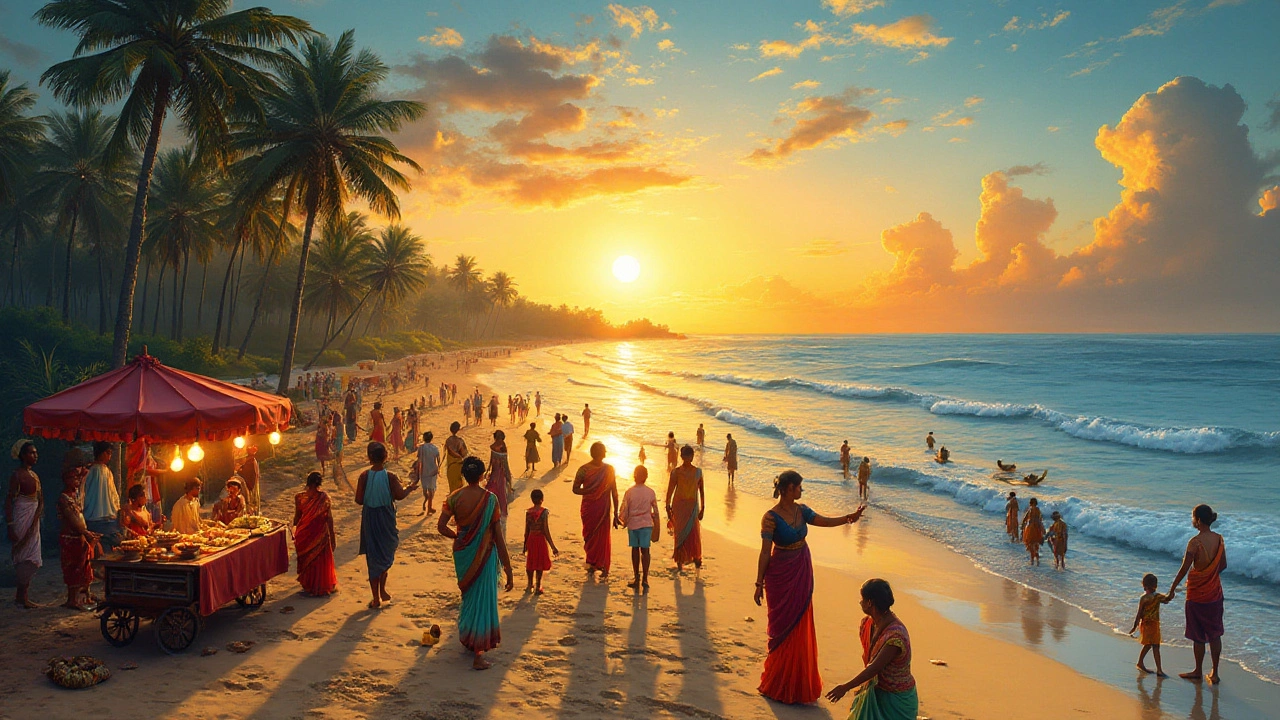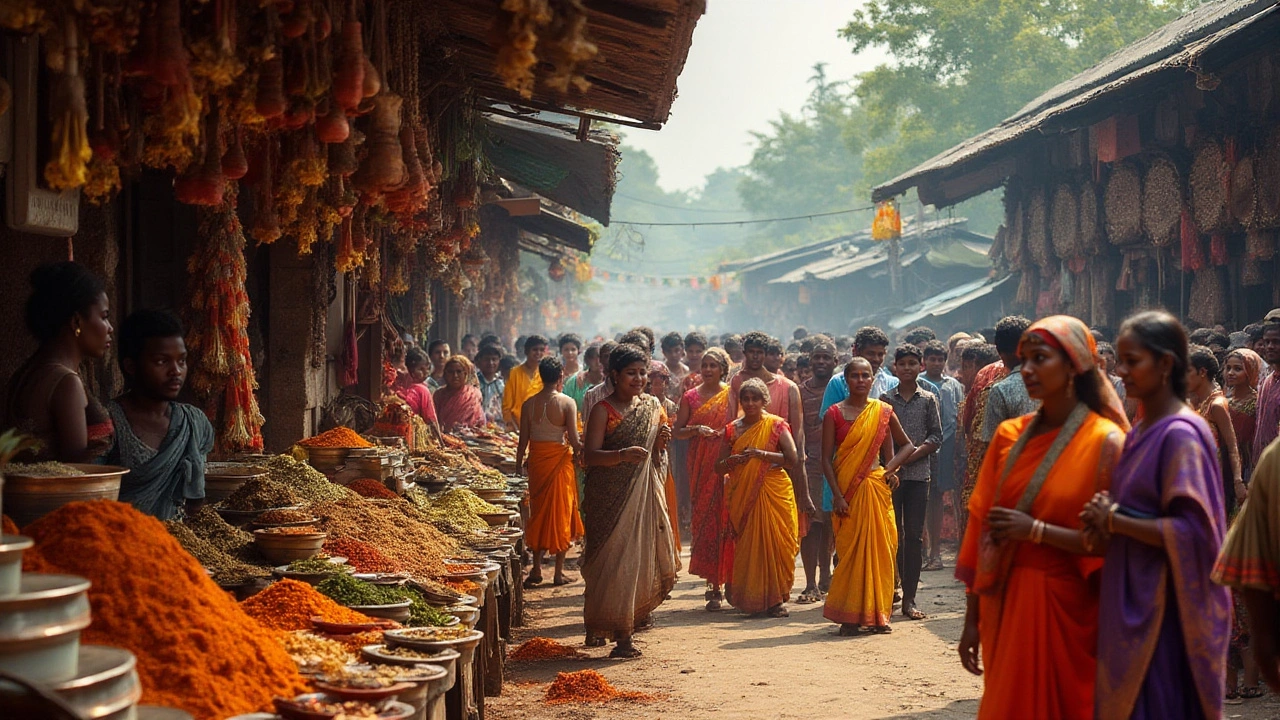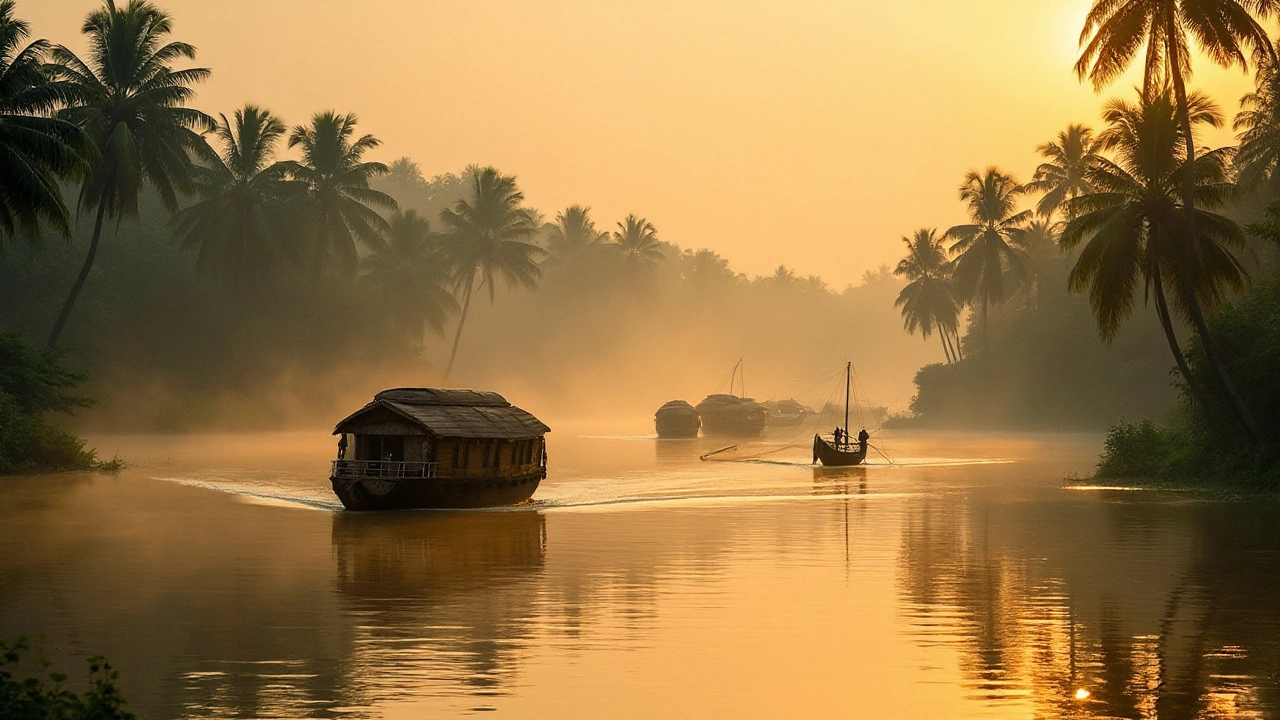Kerala, often dubbed ‘God’s Own Country,’ is an exotic slice of heaven nestled in the southern part of India. It's a land where lush green landscapes meet tranquil backwaters, and ancient traditions harmonize with the modern rhythm of life. Tourists flock here for the scenic beauty, but more so for the unique cultural experiences that the state offers.
The question arises for many potential visitors: Is Kerala safe for tourists? This inquiry roots itself in genuine curiosity and a need to unravel both the allure and the practical aspects of traveling through this enchanting region. In essence, like any destination, having a grasp of local norms and safety tips can enrich one's experience.
This guide delves into the elements that contribute to a fulfilling and secure Kerala adventure. From cultural nuances to understanding nature’s unpredictability, let's journey through the essentials of what makes Kerala a captivating yet conscientious destination.
- Understanding Kerala's Safety Landscape
- Cultural Etiquette and Local Insight
- Health and Travel Precautions
- Navigating Nature: Beaches, Wildlife, and Backwaters
- Practical Tips for a Safe Journey in Kerala
Understanding Kerala's Safety Landscape
Kerala has long been celebrated for its unique beauty and hospitable culture, making it a magnet for travelers seeking a multifaceted adventure. An outstanding mix of lush landscapes, rich traditions, and a laid-back lifestyle makes it appealing. Yet, as with any travel destination, it's critical to understand the safety landscape to ensure a pleasant journey. Crime rates in Kerala are generally lower compared to many other Indian states, and tourists typically find themselves in a relatively secure environment. The locals are known for their warmth and welcoming nature, often going out of their way to help visitors. This sense of community contributes significantly to the region's reputation as a safe haven for travelers.
Safety in Kerala extends beyond just physical security; it encompasses health and environmental factors as well. Unlike the hectic pace of life in some Indian cities, Kerala's environment promotes tranquility and mental peace, aiding comfort for tourists. However, travelers should still exercise the usual travel caution, such as safeguarding personal belongings and avoiding isolated areas at night. According to BBC Travel, "Kerala offers a serene landscape but like any tourist spot, awareness and mindfulness are key to a safe experience."
In Kerala, the tourism police are dedicated to assisting tourists and ensuring their safety across hotspots. They maintain a visible presence in major destinations and are well-trained to handle various situations related to tourist security. Many visitors appreciate this resource, knowing that help is readily available if needed. When it comes to road safety, travelers should be aware that traffic can be quite chaotic, especially in urban areas, and using reliable taxi services is recommended. Investing in travel insurance tailored to your needs is a sensible step to cover unforeseen circumstances.
Data highlights Kerala’s commitment to improving safety for all. The region has implemented several initiatives designed to boost tourism while prioritizing traveler safety. For instance, states have begun investing in smart tourism projects which integrate technology to enhance visitor safety. Despite its peaceful ambiance, Kerala's monsoon season can lead to unpredictable weather conditions, posing potential risks such as landslides and flooding. Awareness of the local weather forecast and contingency planning ensures a smooth journey. Tap into local resources like maps and sunblock since coastal areas require extra precautions against strong sunshine.
Cultural Etiquette and Local Insight
When visiting Kerala, a state rich in diversity and cultural vibrancy, understanding and respecting local customs can greatly enhance your experience. Known for its multi-ethnic fabric, Kerala embraces a tapestry of cultures, predominantly Hinduism, Islam, and Christianity. This diversity manifests itself in the region’s festivals, rituals, and culinary wonders. Festivals such as Onam, celebrated with grand enthusiasm, offer tourists a glimpse into the historic significance and communal harmony that defines Kerala. The state's legendary hospitality, or 'Athithi Devo Bhava'—a Sanskrit phrase meaning 'The Guest is God'—is genuinely felt as you engage with the locals.
As a visitor, adapting to cultural norms can be as rewarding as exploring scenic landscapes. Dress modestly, particularly when visiting religious sites, to show respect for local traditions. It's advisable to wear clothing that covers shoulders and knees. When touring temples, be prepared to remove your shoes, a customary practice. Kerala's cuisine is a journey in itself—indulge in dishes like 'sadhya', a traditional vegetarian feast served on banana leaves. Often, the warmth and richness of the meal come with an offering of insights into Kerala’s culinary narrative.
"Kerala is not just a place to visit, it's a culture to experience," notes Ritu Dalmia, renowned Indian chef and restauranteur, emphasizing the holistic immersion one undergoes in Kerala.
Language could pose a barrier, as Malayalam is spoken predominantly, yet many people understand and communicate in English, especially in tourist-heavy areas. Embrace the opportunity to learn a few basic Malayalam phrases – locals often appreciate the effort and are more than happy to help when approached. Bargaining is common in local markets, and it's considered respectful to engage in this practice, but do so politely. Respecting local customs not only enriches your travel experience but also paves the way for cultural exchange, turning a simple visit into a profoundly transformative journey.
Be mindful of Kerala's traditional dance forms like Kathakali and Mohiniyattam, which are expressions of ancient histories and mythologies. Enjoy watching these performances, often accompanied by live music, with attention and decorum expected by both the artists and audience. Photography is typically allowed but ask for permission if you plan to capture these captivating moments. Remember, immersing yourself in the local culture is not just about watching but witnessing the deep roots and history that make Kerala a unique quilt of traditions, knit over centuries.
Also, engage with the people on their traditional crafts, from coir making to handloom weaving, understanding the intricate processes that have been passed down through generations. This way, tourists contribute to the preservation of these centuries-old traditions. Being an active participant, rather than just an observer, aligns perfectly with Kerala's spirit of inclusivity and makes your travel more memorable. As you navigate through these cultural interactions, you'll find that maintaining mutual respect and open-mindedness often leads to the most rewarding experiences.

Health and Travel Precautions
Ensuring a healthy and safe travel experience in Kerala requires a bit of planning and vigilance. This region is known for its monsoons, verdant landscapes, and lush backwaters, which create a unique ecosystem. While this beauty is captivating, it’s wise to be aware of certain health considerations endemic to the area. First, let's talk about vaccinations. Before visiting South India, it’s advised to check if you need vaccinations for Hepatitis A, Typhoid, and Diphtheria. While India generally has excellent healthcare, it’s always better to prevent than cure. Make sure to schedule these vaccinations several weeks before your departure to allow them to take full effect.
An often-discussed topic among travelers is the concern of water safety, especially when indulging in the delicious local cuisine. Kerala offers some of the finest dishes you will ever taste, but to ensure your health, it's crucial to drink only bottled or purified water. Avoid ice in your drinks unless you are certain it's been made from safe water. Eating freshly prepared hot food is advisable as it minimizes the risk of ingestion-related illnesses. Street food is tempting and often safe if you can see it being freshly cooked, so indulge wisely.
According to the World Health Organization, India faces significant challenges with vector-borne diseases. This is a reality that travelers need to be aware of.
Mosquitoes in Kerala are active especially during and after the rainy seasons, bringing with them risks such as dengue and malaria. It's recommended to carry a potent mosquito repellent and use it during dawn and dusk hours when these insects are most active. Wearing long sleeves and pants can also help shield you from bites. Many accommodations provide mosquito nets or air-conditioned rooms which help keep the issue at bay, allowing you to relax and enjoy without worries.
Weather conditions also play a pivotal role in your travel plans. Temperatures in Kerala can be quite humid, especially in the summer months. This can cause dehydration if you're not careful, so it's essential to keep yourself hydrated. Carry a refillable water bottle and take regular breaks in shade to prevent heat-related illnesses. Packing a hat, sunglasses, and a high SPF sunscreen should be on your checklist.
A common traveler misstep is not factoring timing and prescription medication necessities. It's worth noting that pharmacies in Kerala are well-stocked, but it’s wise to bring along a basic first-aid kit and any personal prescription medications in your original prescription bottles. Not only is this practical, but ensures you have what you need without the fuss of language barriers at pharmacies.
Consider travel insurance as an important part of your health and travel precautions. Not only does this provide peace of mind, covering unforeseen medical expenses in Kerala, but also safeguards against other travel disruptions such as flight cancellations or lost luggage. With these preparations, you can focus on the joy of discovering Kerala's cultural richness and natural splendor in good health.
Navigating Nature: Beaches, Wildlife, and Backwaters
Exploring the natural beauty of Kerala gives rise to experiences that linger in the memory long after the trip is over. The beaches of Kerala, such as Kovalam and Varkala, are popular not just for their natural beauty but for the activities they offer, from surfing to yoga retreats. The golden sands and scenic vistas provide a perfect backdrop for relaxation and adventure, but it's crucial for tourists to be mindful of water safety measures, especially during the monsoon months when the sea can be dangerously unpredictable. Following lifeguard advice, understanding tide timings, and swimming in designated areas can contribute markedly to a safe and enjoyable beach day.
Kerala's wildlife is equally mesmerizing. The state is home to a wealth of biodiversity, with national parks like Periyar and the Western Ghats serving as sanctuaries for a myriad of species. Visitors can embark on safaris, nature walks, and boat cruises, offering glimpses of majestic elephants, elusive tigers, and vibrant birdlife. While the allure of getting closer to nature is undeniable, respecting boundaries and maintaining a safe distance from wildlife is not just a suggestion; it's imperative for both the safety of the visitors and the preservation of nature. As the famous conservationist Jim Corbett once said,
"The tiger is a large-hearted gentleman with boundless courage."This respect is essential in all interactions with wildlife.
Perhaps the most serene experience in Kerala is drifting along its tranquil backwaters. Houseboats on the Vembanad Lake or the Alleppey canals offer a unique peek into the traditional village life lining these waterways. These houseboats are floating havens, equipped with modern amenities ensuring comfort amidst nature. However, travelers should ensure they book with licensed operators to prevent any mishaps. While the backwaters are serene, safety should never be an afterthought. Checking weather conditions, making sure life jackets are available, and having a local contact for emergencies are simple measures that guarantee a worry-free cruise.
Understanding nature's unpredictable beauty is at the heart of exploring Kerala. Recommended visits include the Neelakurinji bloom in the hills of Munnar and the serene Athirapally Falls. Certain areas might require guided tours for safety due to challenging terrains, and respecting these guidelines ensures not only personal protection but also the preservation of these beautiful sites. Planning, awareness, and a touch of adventure spirit make navigating Kerala’s natural wonders a highlight of any travel itinerary.

Practical Tips for a Safe Journey in Kerala
Planning a journey to the stunning beauty that is Kerala comes with a whirl of excitement and expectation. As you prepare to walk along pristine beaches and sail through its famed backwaters, knowing how to stay safe will ensure a truly memorable adventure. Before setting foot on this vibrant land, familiarize yourself with some basic safety tips that can help navigate this exotic locale. Understanding the region can significantly enhance your experience, making it both pleasurable and secure.
Stay Acquainted with Local Customs
Culturally, Kerala is welcomed by people for its hospitality and warmth. It’s worth understanding some cultural norms to make your travels more seamless. Respect for elders, an eagerness for conversation, and gratitude for services rendered are vital. Embrace modest dressing, especially when visiting religious sites. Prioritizing this not only shows respect but also helps you feel more at ease amidst the local crowd. Don’t be surprised if the locals engage you in insights about their culture—an act often seen as a reflection of their immense pride in their heritage.
Health and Hygiene Essentials
The tropical weather in Kerala is inviting, yet it brings some unique challenges. Carry sunscreen to protect yourself from the sun's potent rays, especially when exploring outdoor sites. Hydration remains crucial—drink plenty of bottled water, but check if it’s sealed properly. Avoid roadside food stalls if you have a sensitive stomach; opt for restaurants with good reviews. Consult your doctor about any necessary vaccines as a precaution. Remember, a healthy traveler is a happy traveler, so don’t ignore these small yet significant health tips.
Interacting with Kerala's Diverse Environment
Kerala's landscape is one of its major attractions, with luscious forests, serene beaches, and biodiversity-rich wildlife sanctuaries. When exploring these natural wonders, exercise care; weather conditions change quickly. During monsoons, roads can be slippery, and paths in forested areas might become tricky to traverse. When venturing into wildlife reserves, opt for guided tours where experts can enhance safety as well as enrich your understanding of the ecosystem. Appreciate nature, but from a distance that respects both your safety and the environment’s integrity.
According to the Ministry of Tourism, India, “Adhering to local advisories can make travel more rewarding and safer.”
Transportation and Connectivity Tips
Navigating the roads of Kerala requires preparation. While public transportation like buses and trains offer an authentic experience, they are often crowded. For more comfort, consider hiring a car with a driver familiar with the winding routes. If using local taxis or auto-rickshaws, confirm fares in advance or ensure the meter is running. Keep an offline map handy and don’t solely rely on GPS as network issues can sometimes interrupt service in remote areas. These measures not only ease travel but also keep potential hazards at bay.
Keeping Personal Belongings Secure
Like in any travel destination, safeguarding your belongings is key. Use a money belt to store cash and copies of travel documents. Displaying expensive jewelry or gadgets can make one an easy target for theft. Most accommodations offer safes or lockers, so avail these facilities to keep valuables protected. Opt for travel insurance for added peace of mind. Always keep an eye on bags, especially in crowded places such as markets and public transport. By treating your belongings with attentiveness, you mitigate risk and can focus on enjoying your travel experience fully.
